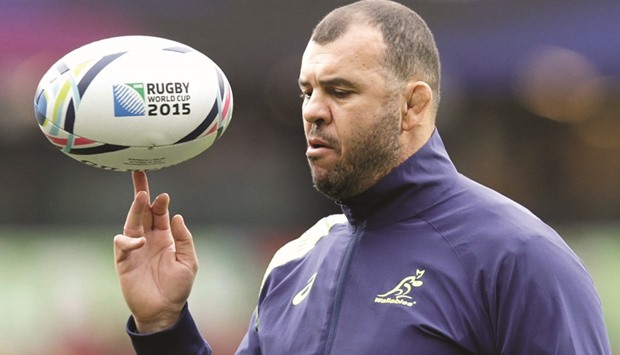Reflecting on the Wallabies’ car crash 2016 season, it’s tempting to call for coach Michael Cheika’s immediate sacking as head coach. His removal is easily justified — played 15, won six, lost nine.
It’s a terrible return despite the sugar-coating by sycophantic local media, including some who embarrassingly tipped the Wallabies to roll England three-zip in the June series and who, despite the complete opposite outcome, then talked up the prospects of a grand slam in the just completed European tour. The glowing pre-Test commentary has been cringe-worthy at times.
Indeed, the comedown for Cheika, who took the Wallabies to the World Cup final in 2015, has been epic — and in no small measure due to overblown public expectations fuelled by sympathetic and wildly optimistic local coverage.
There’s no enduring shame in losing all three Tests against the All Blacks (the New Zealanders were quite simply at another level to everybody else this year, notwithstanding Ireland’s magnificent and historic Soldier Field win). But losing to England 4-0, including a three-Test series at home in June and the November fixture at Twickenham?
The Australian rugby team, two-time World Cup winners, should never lose a home series 3-0 to anyone. The last time it happened was against South Africa almost 50 years ago. The season has been one big rotten apple, and the June series whitewash the very core of it.
Despite headlines to the contrary, there are no silver linings. The last Wallabies coach to lose nine games in one season got the punt. Eddie Jones was actually a very good coach, arguably the best in the business at present. So why should Cheika, schooled by Jones at every turn this year, keep his job? If a coach as good as Jones gets axed after nine losses, shouldn’t Cheika get the same?
The answer is an emphatic no. He has to remain Wallabies coach for one crucial reason — his knowledge of the rapidly evolving international player market. Specifically, he knows what it will take to contract the Wallabies of tomorrow. In this respect, he is arguably the most precious asset the Australian Rugby Union have to turn around the flagging fortunes of the national team.
We must accept the Wallabies’ best players are not playing Super Rugby. They’re in Japan, England and France. That’s the reality. It won’t change.
The Wallabies of 2016 simply didn’t have the talent to be competitive. With the exception of Israel Folau and David Pocock, the best Australian players are all overseas — Will Genia, Nic White, Kurtley Beale, Matt Toomua, Adam Ashley-Cooper, Matt Giteau, Drew Mitchell and Liam Gill to name a few.
More players will surely follow, and most worryingly those at the tier below Test level; promising NRC and Super players who will find the money on offer abroad too good to knock back. What’s happening here is a basic jobs market — the workforce gravitates to where the work pays best. And it’s not in Australia or South Africa.
Cheika as a coach can only work with the talent at his disposal — and he has slim pickings at present. However, Cheika as a savvy businessman with knowledge and experience of European player workforce markets, can assemble a world-class team brimming with talent and depth, to not only keep the Wallabies competitive, but also to start having realistic ambitions of winning another World Cup. As things stand, Australia winning the 2019 World Cup is nothing but a pipedream.
The ARU chief executive, Bill Pulver, must take Cheika’s cue on what needs to happen. It’s no longer purely about retention. Only Pocock, Folau and Bernard Foley, and maybe one or two others, are retention targets — the best have already left. Now the conversation and focus has to be about contracting the best back into the national team, and restructuring the national program to accommodate for the global player market reality of players dropping in and out when required for national duties.
International football does this, including what is now arguably the country’s premier national team, the Socceroos (it used to be the Wallabies). Australian rugby has to follow suit. The 60-Test threshold “Giteau Law” be damned. Throw the gates open. There’s no choice.
Cheika and Pulver have probably heard enough from Jones to last a lifetime. They should, however, heed his views on this issue.
“The ARU must formalise a retention plan which starts with clearly identifying the players they must keep for the 2019 World Cup,” Jones wrote in a Courier-Mail column. “There are number of strategies to use — sabbaticals, flexibility in selecting players from overseas clubs and use of feeder clubs. A good plan for retention implemented today is better than an excellent plan implemented tomorrow. Number one is being proactive, not sitting on hands in some trendy cafe in rugby boss Bill Pulver’s Sydney suburb of Mosman.”
Jones wrote those comments two years ago. Pulver has been too slow to react. It’s time for him to double down on Cheika and give him the authority to travel the world and cut the deals needed to keep the Wallabies strong. Cheika the international player contractor will, in time, give way to Cheika the winning coach. He can’t be the later until he assumes the role of the former.

Michael Cheika
